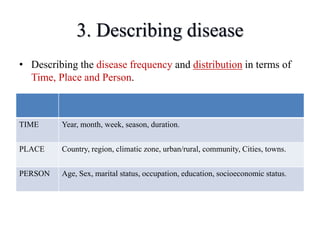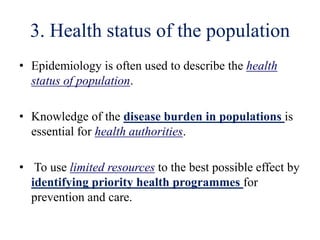1 Which Bests Describes the Difference Between Epidemiology and Medicine
Which bests describes the difference between epidemiology and medicine. A It is the best because if the sensitivity test correctly identifies all potential cases as either negative or positive.

Which Health Studies Are Reliable Acsh Explains Epidemiology American Council On Science And Health
Epidemiology focuses on acute illnesses.

. B A clinical trial refers to a research activity that involves the administration of a test regimen. Session 1 - Be familiar with the approach John Snow used to investigate the London cholera. To develop appropriate vaccines and treatments which can prevent the transmission of the disease to others.
Objectives of Epidemiology. You will be responsible for reviewing the following course materials. If the disease.
Medicine focuses on metabolic diseases. Medicine is primarily for profit. The key feature of analytic epidemiology is a comparison group.
The line-listing in Table 61 has been sorted by days between vaccination and onset to reveal the pattern of this important timeevent association. In the definition of epidemiology distribution refers to descriptive epidemiology while determinants refers to analytic epidemiology. Medicine focuses on individual health.
To determine the extent of disease found in the community. Chapters 1-3 and the end-of-chapter questions in the textbook by Aschengrau and Seage. Is the study of the distribution and determinants of disease frequency in human populations and the application of this study to control health problems.
PRINCIPLES AND PRACTICE OF EPIDEMIOLOGY 1. There are two broad types of epidemiological studies. Describe various study designs and their strengths and limitations.
Medicine focuses on chronic diseases. The answer is option B. This arrangement facilitates sorting to reorganize cases by relevant characteristics.
In case control study the subjects are selected because they have the outcome disease of interest while the members of the control are selected because they do not have the outcome disease of interest. Session 1 lecture slides. Epidemiology focuses on population health.
Descriptive vs Analytical Epidemiology Descriptive Epidemiology refers to the studies that generate hypotheses and answer the questions who what when and where of the disease or infection. Consider a large outbreak of hepatitis A that occurred in Pennsylvania in 2003 Investigators found almost all of the case-patients had eaten at a particular restaurant during the 26 weeks ie the typical incubation period for hepatitis A before onset of illnessWhile the investigators were able to narrow down. Unethical use is strictly forbidden.
Epidemiology is a health care discipline with an important distinction. So distribution covers time when place where and person who whereas determinants covers causes risk factors modes of transmission why and how. Introduction This article provides a brief overview of principles of epidemiology and clinical research design and covers all the topics required by the American Board of Pediatrics content outline pertaining to study types and uses the same alphabetical numbering in the.
Medicine focuses on individual health. 88 Describe the ecologic correlation. Epidemiology focuses on population health.
Types of Epidemiological Studies. Epidemiology is the branch of medical science that investigates all the factors that determine the presence or absence of diseases and disorders. Answers to Self-Assessment Quiz.
Specifically epidemiology uses science systems-thinking and data to determine the underlying causes of different diseases and health outcomes in a population. The patient isnt an individual but rather an entire community or population. Commonly in descriptive epidemiology you organize cases by frequency of clinical findings 3.
Experimental studies deliberate intervention is made and the effect of such intervention is observed. Read the Anthrax Fact Sheet on the following 2 pages then answer the questions below. Observational studies we do not interfere in the process of the disease but simply observe the disease and the associated factors.
Analytic Epidemiology refers to the studies that are conducted to test for hypotheses and to generate conclusions on the particular disease. Epidemiology focuses on studying how determinants and distribution of disease frequency occur in human populations. To identify the etiology or cause of a disease and its relevant risk factors ie factors that increase a persons risk for a disease.
Epidemiology focuses on infectious diseases. Medicine focuses on individual health. Epidemiology focuses on population health.
Epidemiology focuses on studying the determinants and distributions of states or events relating to health in specific populations and on applying the results of this study to put health controls in place. Describe its causation in terms of agent host and environment. REVIEW SHEET FOR QUIZ 1 PUBH 6003.
Epidemiological research helps us to understand how many people have a disease or disorder if those numbers are changing and how the disorder affects our society and our economy. Disease refers to a broad array of health-related states and events including diseases injuries disabilities and. See answer 1 physician concern with disesase in the individual patient where as the epidemiologist concern with disease pattern in the entire population.
For each of the following risk factors and health outcomes identify whether they are necessary causes sufficient causes or component causes.

How To Calculate Relative Risk Evidence Based Medicine Cohort Study Calculator

A Common Model Used In Public Health Illustrates The Relationships Among An Agent A Host And The Environment It Applies To How To Apply Sudbury Public Health

The Research Designs May Be Roughly Categorized As Observational Or Experimental The Experimental Studie Study Design Research Methods Observational Study

Clinical Questions Pico Study Designs Evidence Based Medicine Resource Gu Evidence Based Medicine Evidence Based Practice Nursing Evidence Based Practice

Delfini Tutorial Critical Appraisal Essentials Matter Science Research Methods Evidence Based Medicine

The Three Types Of Prevention Primary Prevent The Initial Development Of The A Disease Secondary Early Detection Of Prevention Secondary Learning Science

Epidemiology Study Design Graph Study Design Research Methods Study

Oxford Handbook Of Clinical Pathology Pdf Free Download Medical Textbooks Medicine Book Pathology

Describing The Four Phases In Testing New Drugs In Clinical Trials Clinical Trials Clinic Clinical Research

This Graphic Shows The Interrelated Factors In Determining The Validity Of Screening Tests Clinical Trials Study Positivity Positive Test

Common Types Of Fractures With Illustrations And Brief Descriptions Types Of Fractures Spiral Fracture Fractures

Statistical Studies Cross Sectional Study Observational Study Research Methods

Diseases And Causation Therories Community Health Nursing Health Science Health Promotion

Basic Concepts And Principles Of Epidemiology

Brief Descriptions Of The Fathers Of Public Health And Epidemiology Physical Environment Public Health Observation

Basic Concepts And Principles Of Epidemiology

Four Major Pillars Of Primary Health Care System Phc Health Care Healthcare System Nursing Notes

Math For Nursing School Community Health Nursing Nursing Students Nursing Study Tips

Comments
Post a Comment